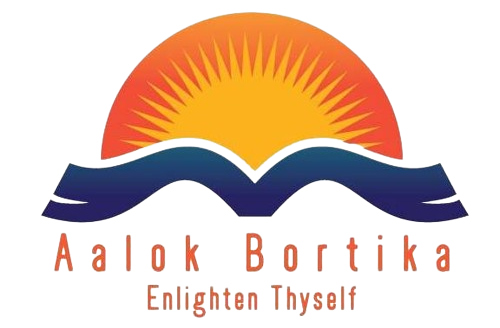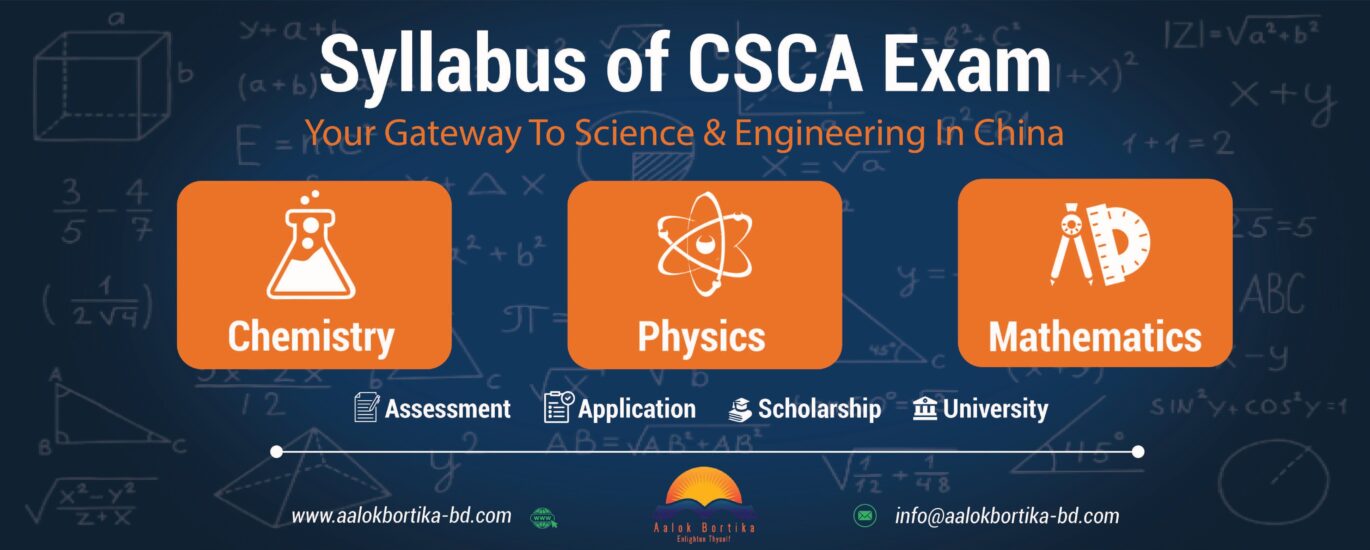Syllabus of CSCA Exam
The China Scholastic Competency Assessment (CSCA) Exam is a standardized assessment designed for international students seeking undergraduate admission to science and engineering programs at Chinese universities under the China Scholarship Council (CSC) framework. Released in its 2025 edition, the exam evaluates foundational competencies in three core subjects: Chemistry, Physics, and Mathematics. Each subject-specific paper is structured identically in format but tailored to discipline-specific content, ensuring a rigorous yet accessible evaluation of scientific thinking, problem-solving, and experimental inquiry skills essential for higher education in China.
Examination Overview
Common Structure: All three CSCA subject examinations share a standardized format designed for efficiency and comprehensive assessment:
- Duration: 60 minutes per subject
- Total Score: 100 points per subject
- Language Options: Chinese or English
- Question Format: Multiple Choice (Single Answer)
- Number of Questions: 48 questions per subject
This uniform structure ensures consistency across all subjects while allowing adequate time for students to demonstrate their competencies in each discipline.
CSCA Mathematics Examination Syllabus
The mathematics examination focuses on evaluating students’ mastery of mathematical knowledge with particular emphasis on fundamental skills, logical thinking ability, and problem-solving competence. It establishes whether students possess the academic foundation necessary for undergraduate studies in mathematics and related science and engineering disciplines.
Content Modules
- Sets and Inequalities
- Functions
- Geometry and Algebra
- Probability and Statistics
Key Topics
Module | Detailed Content |
Sets and Inequalities | This foundational module covers the definition, operations, and representation of sets, alongside basic properties and solution methods for various types of inequalities, including quadratic and rational inequalities |
Functions | Students are tested on their understanding of function concepts and properties such as domain, range, monotonicity, and parity. The module includes basic elementary functions (power, exponential, logarithmic, and trigonometric functions), sequences with emphasis on arithmetic and geometric progressions, and introductory calculus concepts including derivatives, their geometric meaning, and simple applications. |
Geometry and Algebra | This module encompasses plane analytic geometry, covering equations and properties of fundamental curves including lines, circles, ellipses, hyperbolas, and parabolas. It also addresses vectors and complex numbers, including vector operations and basic complex number operations, as well as solid geometry with focus on rectangular coordinate systems in space and properties of simple solids. |
Probability & Statistics | The examination includes classical probability models and probability calculations, numerical characteristics of data such as mean and variance, and basic concepts of normal distribution. |
Preparation Insights: The CSCA exams emphasize conceptual understanding over rote memorization, with multiple-choice questions testing application in real-world scenarios. Students should prioritize high-school curricula aligned with these scopes, practice timed problem-solving, and review experimental safety and industrial applications. Success in these exams demonstrates readiness for China’s competitive STEM programs, supported by CSC scholarships.
CSCA Physics Examination Syllabus
Purpose and Objectives: The Physics examination assesses core physics competencies required for undergraduate science and engineering programs. It evaluates students’ mastery of fundamental physical principles, scientific thinking, and ability to apply knowledge across disciplines. These competencies provide essential support for fields such as mechanical engineering, electrical engineering, and materials science.
Content Modules
- Mechanics
- Electromagnetism
- Thermodynamics
- Optics
- Modern Physics
Key Topics
Module | Detailed Content |
Mechanics | This comprehensive module covers kinematics including displacement, velocity, acceleration, uniform acceleration motion, and free fall motion. It examines Newton’s laws of motion and their applications, momentum and impulse with the law of conservation of momentum, work and energy principles including conservation of mechanical energy, circular motion and universal gravitation, as well as simple harmonic motion and mechanical waves. |
Electromagnetism | Students are tested on electrostatics including Coulomb’s law, electric field strength, and electric potential. The module covers direct current circuits with Ohm’s law and series/parallel circuit configurations, magnetic field concepts including magnetic induction, Ampere’s force, and Lorentz force, and electromagnetic induction featuring Faraday’s law and Lenz’s law. |
Thermodynamics | This section addresses the kinetic theory of gases, the ideal gas equation of state, and the first law of thermodynamics. |
Optics | The optics module is divided into geometrical optics, covering laws of reflection and refraction, and physical optics, addressing interference and diffraction phenomena. |
Modern Physics | This forward-looking module includes the photoelectric effect, atomic structure, and fundamentals of nuclear physics, preparing students for contemporary physics applications |
.
CSCA Chemistry Examination Syllabus
Purpose and Objectives: The Chemistry examination evaluates core chemistry competencies necessary for undergraduate studies in science and engineering. It assesses students’ mastery of fundamental chemical knowledge, understanding of scientific thinking, and ability to conduct experimental inquiry. These competencies form the foundation for disciplines including chemistry, chemical engineering, materials science, and environmental engineering.
Content Modules
- Basic Chemical Concepts and Calculations
- Properties and Reactions of Substances
- Chemical Theories and Laws
- Chemical Experiments and Applications
Key Topics
Module | Detailed Content |
Concepts & Calculations | This module covers classification and state changes of matter, chemical notation and equation writing, solution concentration and pH calculations, calculations involving the amount of substance, and application of the ideal gas law. |
Properties & Reactions | Students are examined on properties of common inorganic substances including elements, oxides, acids, bases, and salts. The module addresses basic organic compounds, particularly hydrocarbons and their derivatives, identification of redox reactions, and ionic reactions with testing methods.. |
Theories and Laws | This theoretical module encompasses atomic structure and periodic law, chemical bonds and intermolecular forces, reaction rate and chemical equilibrium, and theories of electrolyte solutions. |
Experiments & Applications | Practical knowledge is assessed through laboratory safety and use of apparatus, preparation and identification of common gases, methods for separation and purification of substances, and analysis of industrial chemical processes such as ammonia synthesis.. |
Key Features of the CSCA Examination
Comprehensive Assessment: The CSCA examination provides a holistic evaluation of students’ preparedness across three fundamental scientific disciplines. By testing mathematics, physics, and chemistry in a standardized format, the examination ensures that students possess well-rounded scientific knowledge essential for success in diverse engineering and science programs.
Emphasis on Application: Beyond theoretical knowledge, the examination emphasizes practical application, problem-solving abilities, and scientific thinking. This approach ensures that students can not only recall information but also apply their knowledge to real-world scenarios and complex problems.
International Accessibility: By offering examinations in both Chinese and English, the CSCA program accommodates international students from diverse linguistic backgrounds, promoting inclusivity and accessibility for global learners seeking educational opportunities in China.
Foundation for Future Success: The competencies assessed through the CSCA examination are carefully designed to lay a solid foundation for students’ future research, innovation, and engineering practice. The examination content aligns with university-level course requirements, ensuring smooth academic transitions for successful candidates.
Conclusion: The CSCA examination syllabus represents a comprehensive and well-structured assessment framework for international students aspiring to pursue undergraduate studies in science and engineering programs in China. Through its balanced coverage of mathematics, physics, and chemistry, coupled with standardized testing formats and bilingual options, the examination provides an effective tool for evaluating academic readiness while maintaining high standards of scientific education. Students preparing for the CSCA examination should focus on developing strong foundational knowledge, enhancing problem-solving skills, and cultivating scientific thinking abilities across all three subject areas to maximize their chances of success.






